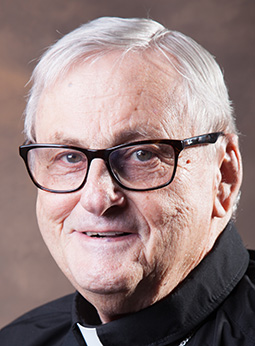 Bp. CaseyCoverage of the Synod of Bishops of the Amazon “missed the boat,” by ignoring one of the primary themes — to save the “lungs of the world,” the environment being exploited by economic interests, said a retired St. Louisan who served there as a bishop.
Bp. CaseyCoverage of the Synod of Bishops of the Amazon “missed the boat,” by ignoring one of the primary themes — to save the “lungs of the world,” the environment being exploited by economic interests, said a retired St. Louisan who served there as a bishop.
The international media centered on the possibility of the synod asking the Holy Father for the faculty to ordain married men who are leaders in the community and have been serving the Church for many years, Bishop Morgan Casey said.
“It seems like the public press was pretty well tuned into that, plus the possibility of having women as deacons,” Bishop Casey said.
While the question of married priests and women deacons dominated debate outside the synod hall, the meeting and the 33-page final document focused more on the environmental destruction of the Amazon and the plight of its peoples, according to the Associated Press.
Bishop Casey, ordained as a priest of the Archdiocese of St. Louis, began serving in the St. Louis mission in Bolivia in 1965. He was appointed auxiliary bishop of La Paz in 1984 and bishop of the Pando, an area at the headwaters of the Amazon River, in 1988. He served that area until his retirement in 2013.
He said that the Amazon region is “being exploited irrationally through the mining industry, through clearing land for grazing, soybeans and timber. Fires that were started, for example, in Bolivia now were started because people were clearing land and they got it out of control. That’s why a huge swatch of the Amazon forest in Bolivia was completely destroyed.”
The Amazon rainforest includes territory belonging to nine countries in South America and has experienced significant deforestation, affecting the indigenous populations and leading to a loss of biodiversity. Bishops of the region have noted that the lands of the Amazon are coveted by agribusiness and large mining companies, which pollute rivers and encroach on land belonging to the indigenous people.
In a visit to St. Louis in March, Bishop Eugenio Coter of Bolivia, who was appointed to the Vicariate of the Pando after Bishop Casey retired, said Pope Francis invoked the synod in part due to the concern for the changing climate and how it will affect the world, especially the poor.
Another reason is to “learn from and work with the indigenous population who have cared for the jungle,” Bishop Coter said. The Church can have an “Amazonian face,” taking from the culture and giving it to others, he said.
Bishop Casey emphasized that “we need to be more aware of the fact that this is our common home, this is our world, and we’ve got to take care of it.”
Because of the difficulty of providing sacraments to the people of the vast region of South America with few priests, the ordination of religious leaders who have a history of serving their communities “certainly is needed, at least it was in the area in which I served,” Bishop Casey said. “There were communities that we got to once a year, and it just took great effort to get to them. Just to be able to have someone there to make the Eucharist available would be a tremendous boon to a Christian community.”
The Catholic community, a community of believers, has a right to the Eucharist, Bishop Casey said. “I hope that the Holy Father will approve this, and I wish that the diaconate will go forward for women. Certainly the women are the servers of the Church. A great majority of our congregation, the people who are active, the people who carry the apostolates in the different organizations, are women. I do feel that they should be recognized in some ministry, and I hope it would be in the diaconate.”
In the Amazon area where Bishop Casey served, women who are leaders could potentially perform ministerial functions that laypeople may already perform in principle but that deacons commonly do — baptize, witness marriages and distribute the Eucharist in their communities, he said.
Bishop Coter said that in his vicariate, about 60,000 people live in areas where priests are not present and, when they are near death, there’s no one available to hear their confession and give them absolution. He cited one community of 60 families that hadn’t had a Mass in 18 years and another in which Catholics participate in a Protestant church because there’s no Catholic church.
The people value the Eucharist, Bishop Casey said. “The Eucharist is what makes us Catholic. It is the heart of our faith. If you have a Christian community that loves God’s Word, meets around God’s Word faithfully and worships as a community, it seems to me that it has a right to the Eucharist, and it’s the obligation of the Church to provide it, however that might be.”